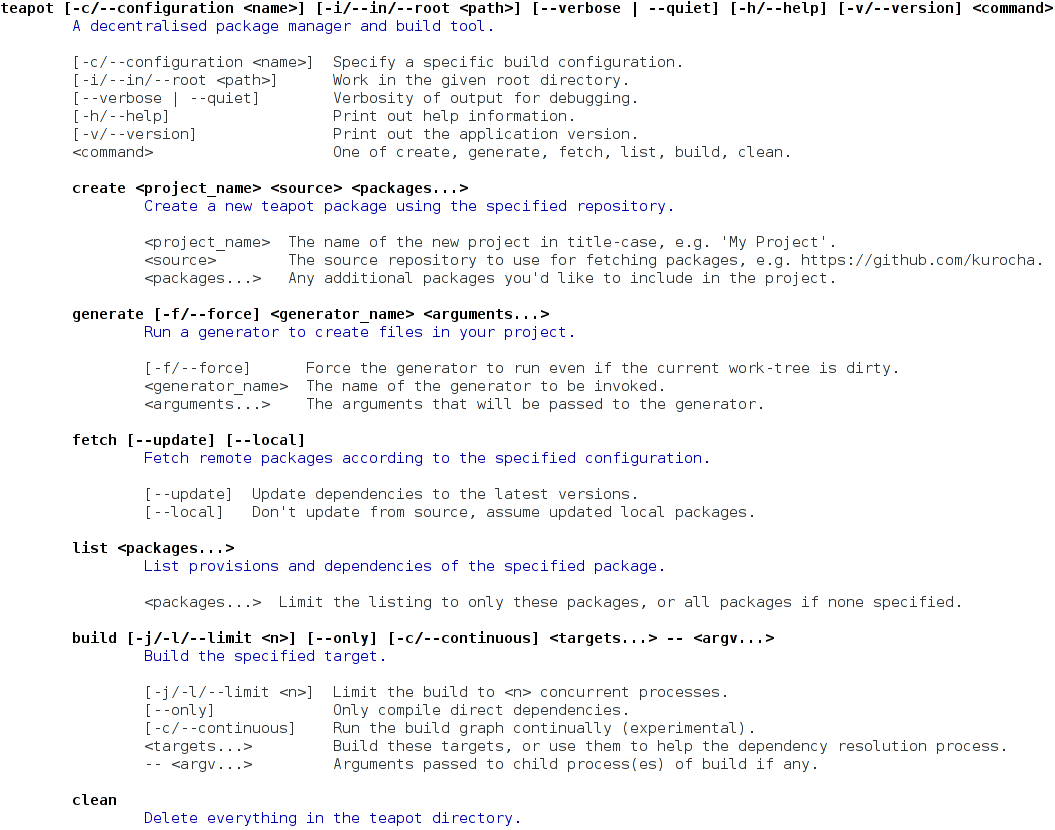Samovar

Samovar is a modern framework for building command-line tools and applications. It provides a declarative class-based DSL for building command-line parsers that include automatic documentation generation. It helps you keep your functionality clean and isolated where possible.
Motivation
I've been using Optimist and while it's not bad, it's hard to use for sub-commands in a way that generates nice documentation. It also has pretty limited support for complex command lines (e.g. nested commands, splits, matching tokens, etc). Samovar is a high level bridge between the command line and your code: it generates decent documentation, maps nicely between the command line syntax and your functions, and supports sub-commands using classes which are easy to compose.
One of the other issues I had with existing frameworks is testability. Most frameworks expect to have some pretty heavy logic directly in the binary executable, or at least don't structure your code in a way which makes testing easy. Samovar structures your command processing logic into classes which can be easily tested in isolation, which means that you can mock up and spec your command-line executables easily.
Usage
Please browse the source code index or refer to the guides below.
Getting Started
This guide explains how to use samovar to build command-line tools and applications.
Releases
Please browse the releases for more details.
v2.4.1
v2.4.0
- Fix option parsing and validation: required options are now detected correctly and raise
Samovar::MissingValueErrorwhen missing. - Fix flag value parsing: flags that expect a value no longer consume a following flag as their value (e.g.
--config <path>will not consume--verbose). - Usage improvements: required options are marked as
(required)in usage output.
v2.3.0
- Add support for
--[no]-thingexplicit boolean flags, allowing users to explicitly enable or disable boolean options.
v2.2.0
- Add support for explicit output: commands can now specify an output stream (e.g.
STDOUT,STDERR, or custom IO objects) via theoutput:parameter inCommand.call.
v2.1.4
Command#to_snow returns the class name by default, improving debugging and introspection.
See Also
Contributing
We welcome contributions to this project.
- Fork it.
- Create your feature branch (
git checkout -b my-new-feature). - Commit your changes (
git commit -am 'Add some feature'). - Push to the branch (
git push origin my-new-feature). - Create new Pull Request.
Developer Certificate of Origin
In order to protect users of this project, we require all contributors to comply with the Developer Certificate of Origin. This ensures that all contributions are properly licensed and attributed.
Community Guidelines
This project is best served by a collaborative and respectful environment. Treat each other professionally, respect differing viewpoints, and engage constructively. Harassment, discrimination, or harmful behavior is not tolerated. Communicate clearly, listen actively, and support one another. If any issues arise, please inform the project maintainers.
Future Work
Multi-value Options
Right now, options can take a single argument, e.g. --count <int>. Ideally, we support a specific sub-parser defined by the option, e.g. --count <int...> or --tag <section> <tags...>. These would map to specific parsers using Samovar::One and Samovar::Many internally.
Global Options
Options can only be parsed at the place they are explicitly mentioned, e.g. a command with sub-commands won't parse an option added to the end of the command:
command list --help
One might reasonably expect this to parse but it isn't so easy to generalize this:
command list -- --help
In this case, do we show help? Some effort is required to disambiguate this. Initially, it makes sense to keep things as simple as possible. But, it might make sense for some options to be declared in a global scope, which are extracted before parsing begins. I'm not sure if this is really a good idea. It might just be better to give good error output in this case (you specified an option but it was in the wrong place).
Shell Auto-completion
Because of the structure of the Samovar command parser, it should be possible to generate a list of all possible tokens at each point. Therefore, semantically correct tab completion should be possible.
As a secondary to this, it would be nice if Samovar::One and Samovar::Many could take a list of potential tokens so that auto-completion could give meaningful suggestions, and possibly improved validation.
Short/Long Help
It might be interesting to explore whether it's possible to have -h and --help do different things. This could include command specific help output, more detailed help output (similar to a man page), and other useful help related tasks.